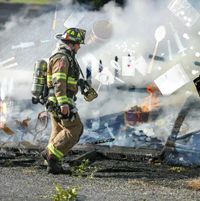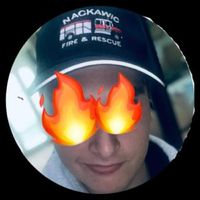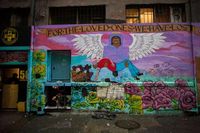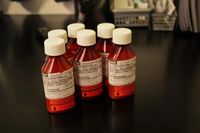My name is Matt, and since I was a young boy, I dreamt of becoming a firefighter. I thought it would be a great opportunity to help people. It felt natural considering my summer job – at the time, I was a lifeguard, I was completing CPR courses, and was instinctively drawn to the idea of being a firefighter. It felt more natural to me than pursuing a career in academia or following my father’s footsteps into the construction industry.
For some time, everything moved along splendidly. If you asked any of my elementary school teachers what they thought I would be doing in 20 years, they would probably answer with something like, “He will do something great!”. Somewhere along the way I got curious with things that made me feel good and became an opiate user.
I trained to be a firefighter, finishing the required college firefighter Pre-Service program with top marks. I furthered my studies, completing related certifications in an attempt to make myself stand out from the crowd, rather than being satisfied with only the minimum requirements to become a firefighter. I am also in good physical shape, so theoretically I should be ready to go and start fighting fires, right? I would like to think so, but it is not so simple.
Being a person who uses drugs, I have a fear of taking the final step and actually applying for a position in a fire department. Specifically, I worry about the drug testing requirements and what it would look like to be a firefighter and a person who uses drugs. How would my fellow firefighters react, or my chiefs? Is this a lifestyle they would condone? I wondered how drinking alcohol was much different from taking opioids. Before I knew it, I found myself researching these subjects. I began to gain a broader understanding of a web of interconnected issues – of substance use among firefighters, mental health, and traumatic events on the job. If I am really going to get past this and take the next step to formally become a firefighter, I hope sharing my story will be a positive step along this journey.
A major barrier for my entrance into the field of firefighting is my fear about the required initial drug test. Things can differ slightly between jurisdictions but once completed, there is usually no further drug testing performed unless a specific incident occurs. This system is outdated, and in my eyes, broken. For example, in Canada, there have been instances of firefighters caught using and selling drugs, even out of fire stations.
"As such, the initial drug test does not appear to be an effective deterrent to drug using or selling among firefighters. Once a firefighter is hired, trauma and other mental health issues arise, often concurrently, and are linked to a drive towards substance use to dull mental pain."
The result is a situation where drug testing serves no real purpose other than further stigmatization, discrimination, and fear. When drug use is stigmatized, the result is higher-risk substance use and less chance of someone revealing their drug use. This may cause some to take actions to hide their substance use and pushing some firefighters to cheat on drug tests and use drugs on shift. From my experience with colleagues who are firefighters, stories I have read, and other anecdotal evidence, some firefighters may bottle-up their feelings and experience trauma that is not properly addressed. The outcomes of this can be substance use including opioids, alcohol or stimulants, and other unforeseen consequences.
I have rarely met a firefighter that did not love the job, but looks can be deceiving. Individuals from all walks of life can suffer silently utilizing a host of complex coping mechanisms, some of which are far from ideal. Among firefighters I have noticed a sick sense of humour can be used in such a way to manage difficult and horrific situations they encounter. Such an atmosphere in firehouses can exacerbate the spectrum of mental health issues affecting firefighters ranging from burnout to PTSD. This, in turn, can contribute to increased substance use among the ranks, in an environment where being open and sincere about one’s difficult personal issues is not always easy.
In a Firefighting in Canada article, firefighter Christopher Howe is quoted as saying “When I took my first drink, all my issues were washed away. I found a lot of acceptance through alcohol and drugs. I knew I was an alcoholic and had been dealing with it for quite some time. I was living a bit of a double life”. This double-life is something substance users and those experiencing issues ranging from mental health to housing instability are all too familiar with. “According to the National Fire Protection Association, 62,085 firefighter injuries occurred in 2016. To help firefighters recover from these injuries, doctors will often prescribe opioid painkillers. While these substances can help relieve pain in the short-term, they can also lead to dependence and addiction if used in excess or over an extended period of time.”
In an additional study from 2012 in Occupational Medicine, “56 percent of firefighters were also past-month binge drinkers”. Additionally, according to the Fire Service Joint Labor Management Wellness-Fitness Initiative, “alcohol is the most common substance abused among firefighters”.
This can lead to shame, stigma, and depression while other mental, social, and substance-use related issues go unchecked.
Firefighters and many other first responders struggle to deal with addiction and mental health issues for a variety of reasons. It can be difficult for them to admit that there is actually an issue. For example, firefighters may become so accustomed to helping others in need, that it can be difficult for them to seek assistance when they then struggle with issues like addiction, PTSD, or depression. The culture in firehouses, which seeks “to uphold an image of invincibility, fear that admitting an issue will make them seem unfit for the job and the negative stigma [of] having a mental health issue may make them appear weaker or defective”, is also a contributing factor.
Lingering behind the vivid mental pictures of the horrific injuries and deaths firefighters witness, is a host of the ongoing fears. These include the possibility of a debilitating, career-ending injury, potential death, and the unimaginable consequences for their families.
These fears are just patiently waiting to sneak into their thoughts when they least expect it. It is part of the burden. Firefighters put the safety of others before their own mental well-being.
Changes should be made to how substance use and mental distress are handled so that firefighters no longer suffer silently, but rather have a chance to manage the stresses which come with their job in nonjudgmental and stigma-free environments. Regarding substance use, approaches that include drug testing, forced drug treatment, and termination of employment, should be re-evaluated. People considering firefighting as a profession should be able to pursue their dreams and deal with personal issues in an environment which encourages a diversity of personalities, openness to new ideas, and approaches. The legacies of stigmatization, prejudice and the status quo, have caused far too much harm to too many, for too long.
A focus on the quality of an individual’s work, rather than predetermined judgments about who they are, as we move away from an atmosphere of fear and hiding which currently exists, should be the norm. This is especially true when the actions of an individual have caused no harm to others. This requires a paradigm shift in firefighting which fosters a more open environment in firehouses focused on teamwork, meaningful communication, and an examination of how substance use and mental health are approached in the profession. Hopefully this would take a more thoughtful form borrowing from harm reduction ideas and other progressive models. For this reality to take shape, a rollback of drug prohibition and the implementation of progressive drug reform policies would significantly aid in fostering such an atmosphere whereby individuals, such as myself, who suffer silently are given the chance to fulfill their potential.
Until then, my personal substance use, in combination with my heart-felt desire to become a full-time firefighter will continue to weigh heavily on me. I don’t want to become another statistic, and moving forward with a career in firefighting might lead to my existing problems being exacerbated. This is a real concern for me, and something tells me I am not alone.





